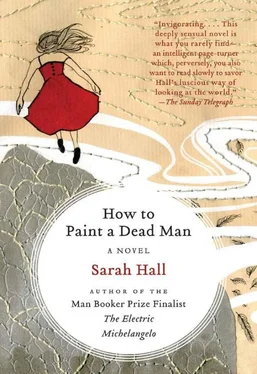Sarah Hall - How to Paint a Dead Man
Здесь есть возможность читать онлайн «Sarah Hall - How to Paint a Dead Man» весь текст электронной книги совершенно бесплатно (целиком полную версию без сокращений). В некоторых случаях можно слушать аудио, скачать через торрент в формате fb2 и присутствует краткое содержание. Год выпуска: 2009, Издательство: Harper Perennial, Жанр: Современная проза, на английском языке. Описание произведения, (предисловие) а так же отзывы посетителей доступны на портале библиотеки ЛибКат.
- Название:How to Paint a Dead Man
- Автор:
- Издательство:Harper Perennial
- Жанр:
- Год:2009
- ISBN:нет данных
- Рейтинг книги:4 / 5. Голосов: 1
-
Избранное:Добавить в избранное
- Отзывы:
-
Ваша оценка:
- 80
- 1
- 2
- 3
- 4
- 5
How to Paint a Dead Man: краткое содержание, описание и аннотация
Предлагаем к чтению аннотацию, описание, краткое содержание или предисловие (зависит от того, что написал сам автор книги «How to Paint a Dead Man»). Если вы не нашли необходимую информацию о книге — напишите в комментариях, мы постараемся отыскать её.
, Sarah Hall, "one of the most significant and exciting of Britain's young novelists" (
), delivers "a maddeningly enticing read... an amazing feat of literary engineering" (
).
How to Paint a Dead Man — читать онлайн бесплатно полную книгу (весь текст) целиком
Ниже представлен текст книги, разбитый по страницам. Система сохранения места последней прочитанной страницы, позволяет с удобством читать онлайн бесплатно книгу «How to Paint a Dead Man», без необходимости каждый раз заново искать на чём Вы остановились. Поставьте закладку, и сможете в любой момент перейти на страницу, на которой закончили чтение.
Интервал:
Закладка:
No. Danny wasn’t unlucky to be killed. The world was unlucky to lose him.
Don’t stick me in the ground. I want Suze to make a big bonfire. Toss me on.
You pocketed the note, took the boxes out to the car. You locked up the flat, and dropped the keys down to the po-faced landlady in the shop below. She said something to you about having him as a tenant. You didn’t hear and you didn’t care. You were thinking about Halloween, when you were teenagers, running crazy between the burning whin bushes. All across the common land in the darkness, the wagging yellow cones of gorse that you had fired. Danny would yell at you to light another one and you’d hold the lighter to the green spines and hear them rat-tat-tat-tatting as they caught. Then you’d take turns to jump across the flames, from blackness into blackness. When you ran and launched yourself Danny would be so afraid and full of laughter. He’d wait on the other side and grab you.
You drove out of town and turned on to the military road towards your parents’ cottage. As you drove into the hills, you had a strange fantasy, about making his pyre, like he had asked you to. You imagined laying his body on a mound of hawthorn and sitting with it as the sun went down and then lighting the fire. The wind would bellow it fierce, until the red embers were hot enough to leave no trace of hair or bone or molar, not even the pins screwed into his leg. His essence would billow across the valley. And when the fire burnt down, the soft tresses of ash would blow away, and nothing would remain above the ruined black cot of stone.
You were thinking of this as you drove back to the cottage, and it was so very comforting, and for the first time in days you felt he was close.
Translated from the Bottle Journals
I fear we are beginning to lose our oldest skills. The repair of mosaics and frescoes is a delicate matter and one that is currently providing much consternation. The younger generations do not understand the manufacturing processes and the raw materials with which we have produced great works. These lessons are still relevant — there is much the medievalists can teach us about quality and application. During class on Thursday I asked the children to tell me about paint, about how it is made and where it comes from. To children, paint is a miracle produced alchemically within the tube. Suppose the shops were shut, I proposed, and the materials not available to us. Suppose the factories stopped making these miraculous tubes. There would be no violet, no orange, or green, or indigo. Is it not a predicament in which we find ourselves? But what solution might there be?
Next I produced quills of goose feather and showed them how to split the shaft and insert and bind the brush and trim the tip, and I gave them a rudimentary lesson on the manufacture of yellow. We walked to the mountainside and took ochre out of its seams with palette knives and the children were obliged to grind the earth with pestles and bind the substance and strain it, which they did with great enthusiasm. Suddenly they were the busy apprentices of the fifteenth century. Now you can see, I said to them, that as artists you are free to paint whenever you choose. The use of such methods is a long and trusted endeavour. It is not naïve. It is not quaint. You can wear the leather apron of the journeyman with pride. You are enabled always by the grace of the land.
Signora Russo permits the children to leave the establishment if they hold a knotted rope, which I must lead. It is knotted to indicate the number of children; each child holds a knot when we walk. I do not know if this is the typical method for transporting her assembly or whether she is worried that I will lose some of them down the burrows and into the lake. I have no trouble remembering where I have placed my shoes each morning, I tell her. I am reminded of the Eastern fairytales my mother told me as a boy. And with our childish knots, safely through the woods we go.
My cough has become less offensive. I have felt well all week and so have postponed the appointment at the hospital. I know I am old and susceptible: I do not need a medical diagnosis stating this. I only need to look up from the page to see that my garden has become a province of tangled grass. The garlic thrives, as do the small fruits and herbs, but much else is running away. We have had heavy rain and the banks have begun to erode. Theresa cannot attend to these tasks, though she has sympathy for the garden and my affection for it and my increasing inability to care for it. Giancarlo has helped with repairs in the past. I have no wish to employ a gardener. It would be to admit defeat.
Theresa is filling her big pan with the last tomatoes as I write. Later she will prick their skins and remove their seeds. She will take the sauce home balanced on her bicycle seat. Today we have not been getting along. Theresa is vexed by the library of books in the house — that is to say my collection of books, catalogues, and pamphlets. The piles are impossible to clean round, she says. Ants nest between them and then march into the kitchen, into the pot of honey and the pot of sweet dates. But ants are marvellous creatures, I tell her. Do you know they have a private stomach for themselves and a public stomach for the good of the colony? If an ant could read a newspaper surely it would choose L’Unità?
She does not wish to be told jokes or teased about her proclivities. She wishes to re-order the books and put them on the shelves. By this she means she wishes to dispose of them. All the shelves at Serra Partucci already contain books. I suspect that she believes books to be unimportant. She is a provincial woman who cannot tolerate literature. Her opinions are intractable and she will not be enlightened. If I contradict her she becomes sullen and puts too much salt into her dishes to dry up my mouth. In the past I have accused her of attempting to poison her employer. We can pass hours in silence if the mood of the day is one of bitter disagreement. The books will leave this residence only after I do and much less quickly than Theresa if an ultimatum is issued. I informed her of this quite plainly this morning. No doubt I have become abrupt over the years. This afternoon, by way of a truce, I found a poem in the collection of Giacomo Leopardi and read it to her. ‘And as I hear the wind rustling among these plants, I go on and compare this voice to that infinite silence.’ He is the most crystalline of writers. She left the room halfway through the recitation. She is often an intolerable creature.
Once I made for Theresa a little straw model to show the frame of a lizard. One long piece and two shorter horizontal pieces twisted to it. It looked, in fact, like her double crucifix. I have also shown the children in the school this replica. This is how the lizard moves, I said, and I bent the front and back legs together on the left, and then I bent the front and back legs together on the right. This is how they can climb to such great height, I said. This gives them great speed and great stability. Do you see? Theresa retrieved her dustpan from the cupboard and swept the model into it and deposited it outside, and then she collected her bicycle and went home.
The slow rusted bicycle of Theresa, its wheels pleading for oil with each rotation as she pushes the contraption down the hill.
There has been no letter from Peter this week. I have been spoiled to receive so many. I think of him often. I wonder how he progresses with his studies and his painting. What are his current philosophies? Which sculptors and colourists does he admire, and how will he begin to articulate these influences? How will this Peter of the Rocks found his church? He should heed the words of Cennini, who writes so intelligently on the subject.
Читать дальшеИнтервал:
Закладка:
Похожие книги на «How to Paint a Dead Man»
Представляем Вашему вниманию похожие книги на «How to Paint a Dead Man» списком для выбора. Мы отобрали схожую по названию и смыслу литературу в надежде предоставить читателям больше вариантов отыскать новые, интересные, ещё непрочитанные произведения.
Обсуждение, отзывы о книге «How to Paint a Dead Man» и просто собственные мнения читателей. Оставьте ваши комментарии, напишите, что Вы думаете о произведении, его смысле или главных героях. Укажите что конкретно понравилось, а что нет, и почему Вы так считаете.












